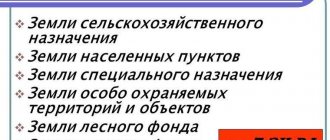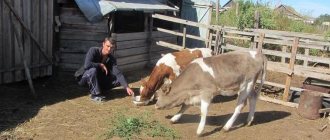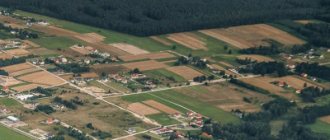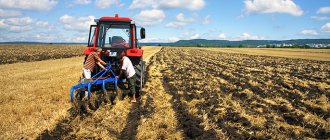Subjects of land legal relations
Land relations are one of the most rapidly developing areas of life. Land in Russia, where peasant farming has developed from time immemorial, has always been the main means of production and investment of capital. Land legal relations are social relations regulated by the norms of land law regarding the acquisition (privatization, purchase and sale, other transactions), use and protection of land, developing between government bodies, individuals and legal entities. The definition of the concept of “land legal relations” is enshrined in Art. 3 of the Land Code of the Russian Federation of October 25, 2001 No. 136-FZ (hereinafter referred to as the Land Code of the Russian Federation), which reveals the content of this legal definition. “Land legal relations” recognize social relations in the field of use and protection of lands as the basis for the life of peoples living in Russia. According to the specified regulatory act, the relations on the use and protection of subsoil, water bodies, forests, wildlife and other natural resources, environmental protection, specially protected natural areas and objects of cultural heritage of the peoples of the Russian Federation are applied accordingly to the legislation on subsoil, forestry, water and other legislation, special federal laws. Property relations regarding the ownership, use and disposal of land plots, as well as transactions with them, are regulated by civil law, unless otherwise specifically stated.
Like other legal relations, land relations are characterized by the presence of the following elements:
- subjects of legal relations (participants in land relations);
- the object in relation to which legal relations arise (in this case – a) land as a natural object and natural resource; b) land plots; c) parts of land plots);
- the content of land legal relations, that is, the rights and obligations of their participants, performing their actions in strict accordance with the rules of law, pursuing the goal for which these relations are formed, while taking into account the characteristics of both the subject and the object of these relations. Sometimes land legal relations include a legal norm that regulates this type of relationship. The presence of a regulatory norm distinguishes legal relations from other social relations. Meanwhile, a rule (a separate regulation, legislation as a whole) is not covered by the composition of legal relations.
Types of legal relations arising in the process of land exploitation
The legal relations that arise in the process of using land are diverse and multifaceted. They arise, change and cease as a result of the participants committing legal and illegal actions. Lawyers qualify them according to various criteria.
A conversation about what types of land legal relations there are should begin with their division into the main institutions of specialized law. According to this classifier, they are divided into relationships associated with:
- land ownership;
- land use;
- state management of land resources;
- land protection;
- legal liability for violation of legal norms.
There is also a classification of land legal relations based on the main economic purpose of the land (their types are provided for in Article 7 of the Land Code of the Russian Federation). In accordance with this legislative norm, the following lands can act as the object of such relations:
- agricultural purposes;
- settlements;
- special purpose: various industries, transport, communications and other areas;
- territories and objects whose protection is given special attention;
- forest or water funds;
- stock.
Public land legal relations are a rather specific institution. In accordance with the legislation of the Russian Federation, their participants can be not only citizens, enterprises and organizations, but also the state itself, as well as local authorities. Classification of legal relations by subject will help participants understand their rights and responsibilities.
As for the functional purpose of land legal relations, they are usually divided into regulatory and law enforcement.
No less important is the division in accordance with the types of legal norms that became the basis for the emergence of relations that arose in the process of using a natural resource. On this basis they are divided into:
- material, arising on the basis of substantive law;
- procedural, which are based on procedural norms.
Participants in legal relations, exercising their right of ownership of land, can perform actions of varying legality. Based on this classifier, legal relations are divided into:
- legitimate,
- illegal.
Land legal relations are also divided into types depending on the degree of mutual responsibilities of their subjects. This can be a relationship of equality, often called partnership, or subordination of one party to the other.
The concept of “Subjects of land legal relations”
Subjects (participants in land relations) are determined in accordance with Art. 5 Land Code of the Russian Federation. They are citizens, legal entities, the Russian Federation, constituent entities of the Russian Federation, municipalities.
The RF Land Code presents the following concepts:
- land owners – persons who are the owners of land plots;
- land users - persons who own and use land plots on the right of permanent (perpetual) use or on the right of free use;
- landowners - persons who own and use land plots on the right of lifelong inheritable ownership;
- land tenants - persons who own and use land plots under a lease agreement or sublease agreement;
- easement holders - persons who have the right to limited use of other people's land plots (easement);
- legal holders of land plots - owners of land plots, land users, land owners and tenants of land plots.
Individuals endowed with land legal personality (a type of general civil legal personality) are considered as subjects of land legal relations, that is, the opportunity to have rights and bear responsibilities in the field of land conservation and land use. Both individuals and legal entities realizing their property interests can act in this capacity.
In accordance with Article 124-125 of the Civil Code of the Russian Federation, the constituent entities of the Russian Federation, as well as urban, rural settlements and other municipalities act in property relations on an equal basis with other participants in these relations - citizens and legal entities. On behalf of the Russian Federation and constituent entities of the Russian Federation, state authorities can, by their actions, acquire and exercise property rights and obligations, and on behalf of municipalities - local government bodies.
The subject composition of land legal relations is regulated by the Land Code of the Russian Federation, but may be specified in other legal acts. Participants in this type of relationship are owners of land plots, land users, landowners, tenants, holders of easements (the Urban Planning Code of the Russian Federation calls them “right holders of land plots”). Their rights to land, depending on the category of this land, have some specifics.
Citizens and legal entities own land and use it on a legal basis (land ownership rights, land use, lease) and are called subjects (right holders) - owners, land users, landowners, tenants. In order for legal entities and citizens to act as subjects of land legal relations, they must have land legal capacity and be bearers of land rights and obligations.
Sample questions to prepare for the test
1. Land as an object of nature, management (use), property. The influence of this trinity on the legal regulation of land relations.
2. Land reform in the Russian Federation. General characteristics.
3. Subject, method, objectives and principles of land law.
4. Land legal relations, their characteristics.
5. Concept, formation and development of land law. The system of land law as a branch of law.
6. The place of land law in the system of Russian law and its interaction with other branches of law.
7. Concept, features and system of sources of land law. General characteristics of the Land Code of the Russian Federation.
8. Concept and general characteristics of ownership of land plots.
9. Forms, objects and subjects of land ownership.
10. The right of private ownership of land.
11.The right of state and municipal ownership of land.
12.Evaluation of land plots.
13. Transactions with land plots (conditions, types).
14.Purchase and sale of land.
15.Pledge of land plots.
16. Concept and general characteristics of the right to use land. Subjects, objects, types of land use rights.
17.The right to lifelong inheritable ownership.
18. Permanent (indefinite) use of land.
19.Rent of land.
20. Free urgent use of land.
21.The right to limited use of other people's land plots.
22. Contents of the right to use land. Restriction of land user rights.
23.Protection of the rights of land owners, landowners, land users and tenants.
24. Guarantees of the rights of land owners, landowners, land users and tenants.
25.Confiscation of land plots for state and municipal needs.
26. Payment for land.
27. Concept and general characteristics of public administration in the field of land use and protection.
28. Types and authorities in the field of land use and protection.
29.Land monitoring.
30.Control over the use and protection of land.
31. State cadastral registration of lands. Concept, structure and procedure for maintaining the state real estate cadastre.
32.Land management (concept, content).
33. The concept of the legal regime of lands, its unity and differentiation.
34. The concept and content of legal protection of land.
35. The concept and features of liability for land offenses.
36.Administrative and criminal liability for land offenses.
37.Civil and disciplinary liability for land offenses.
38. Concept and general characteristics of agricultural land
39.Legal regime of land plots provided to citizens for running a peasant (farm) enterprise.
40.Legal regime of land plots provided to citizens for private farming.
41.Legal regime of land plots provided to citizens for collective and individual gardening, vegetable gardening and summer cottage construction.
42. Concept and general characteristics of lands in populated areas.
43. Concept and general characteristics of the legal regime of industrial, transport, energy... and other special purpose lands.
44. Concept and legal regime of industrial and transport lands.
45. The concept and legal regime of lands of energy, communications, radio broadcasting, television, computer science, defense and other special purposes.
46. Concept and general characteristics of lands of specially protected natural areas and objects.
47. Concept, types and general characteristics of medical and recreational lands,
environmental, recreational and historical-cultural purposes.
48. Concept and general characteristics of forest lands.
49. Concept and general characteristics of water fund lands and reserve lands.
50.Transfer of lands or land plots from one category to another.
Land legal personality of individuals and legal entities
The land legal personality of a legal entity arises from the moment (registration) of approval of its charter in the body of the Federal Registration Service of the Ministry of Justice of the Russian Federation and is special, determined in its scope and content by the goals (objectives) of the activities of this legal entity.
The land legal capacity of individuals arises at the moment of birth. Land legal capacity occurs upon reaching 18 years of age (except in cases of emancipation and marriage). Current legislation provides for a significant expansion of the land legal capacity of citizens. Citizens have the right, at their own choice, to receive ownership, use, or lease of land plots for running a peasant (farm) household, personal subsidiary farming, housing and garage construction, gardening, truck farming, livestock farming, and other purposes related to agricultural production; for business activities and other purposes not prohibited by law.
The Russian Federation, its constituent entities, and municipalities act in land relations in two capacities:
- as regulators of social relations for the use and protection of lands under their jurisdiction on their territory, and in these cases their legal acts are of an authoritative, public legal nature, binding if they are adopted in accordance with the law and within the scope of their competence;
- as owners of land plots in their possession, use and disposal, and in these cases on an equal basis with other participants in land relations, including individuals and legal entities.
Concept and types of objects of land relations
One of the elements of legal relations arising in the sphere of land use is their object. In accordance with Article 6 of the Land Code of the Russian Federation, this category includes:
- Land as a natural object (resource). Can act as an object of relationships in general. As a natural object, it acts in legal relations related to compliance with requirements for protection and rational use.
- Allotments of land. A land plot as an object of land relations is recognized as real estate, which is part of the surface of the earth having certain characteristics. The legislation of the Russian Federation provides for requirements for registration of allotments. The site must necessarily have established boundaries, defined and enshrined in accordance with legal requirements in title documents. The legal status of a land plot includes such important concepts as intended purpose, form of permitted use and method of ownership. All this information is entered into his cadastral passport.
- Parts of land plots. The legislation of the Russian Federation provides that allotments can be divisible and indivisible. The first category includes plots that can be divided into independent plots, used without first transferring the land to another category. The concept of indivisibility is explained in Article 133. In accordance with this norm, a thing is recognized as indivisible, the division of which is impossible without changing its purpose.
The fact that land can act as an object of relevant relations is enshrined in the Land Code of the Russian Federation. This legislative act describes the legal relations associated with the division of land into categories, its protection and use.
Land rights of foreign citizens and stateless persons
Land rights of foreigners are provided for in paragraph 3 of Art. 15 Land Code of the Russian Federation, art. 3 Federal Law “On the entry into force of the Land Code of the Russian Federation” dated October 25, 2001 and in the Federal Law “On the turnover of agricultural land” dated July 24, 2002, in the laws on state immunity, on foreigners, on stateless persons, etc. List border territories in which these persons cannot own land plots, approved by Decree of the President of the Russian Federation of January 9, 2011 No. 26. In addition, since the Federal Law “On the Turnover of Agricultural Lands” does not apply to land plots provided from agricultural lands to citizens for individual housing, garage construction, personal subsidiary and dacha farming, gardening, livestock farming and truck farming, as well as land plots occupied by buildings and structures, foreigners do not have the right to be the owners of such land plots. The scope of rights of foreigners, stateless persons and foreign companies is limited. They cannot be owners of agricultural land. In addition, land ownership is not transferred to foreign citizens free of charge.
Procedure for regulating legal relations arising in the process of land use
Land, like any other legal relationship, is controlled and regulated by the state. To accomplish this important task, he takes economic and legal measures and uses various techniques. Methods of land law mean a set of techniques and methods of influencing the behavior of participants in relations.
Specialists in the field of specialized law identify the main methods of legal regulation:
- Imperative. It is expressed in the establishment of duties and prohibitions that the subjects of legal relations must take into account.
- Dispositive. This is a special method that determines the limits of behavior of subjects of land legal relations and provides them with the opportunity to independently regulate their actions without going beyond the established framework. There are three types of dispositive methods for regulating land relations:
- recommendatory,
- sanctioning
- delegating.
Regulation of land relations is the responsibility of the Russian Federation and its constituent entities. This is provided for in Article 72. The process is controlled by federal legislative and executive authorities and their local branches.
At the state level, regulation is carried out by bodies with the following competence:
- General. This category includes the government of the Russian Federation and the corresponding local executive branches. Bodies carrying out administrative and legal regulation of land relations perform functions within their competence. They manage land funds in the territory under their jurisdiction, regardless of whose ownership or use the land is.
- Special. They are divided into:
- functional: Goskomzem of the Russian Federation, State Committee of the Russian Federation for Environmental Protection;
- sectoral, whose representatives are ministries and departments that control the use of designated lands: the Ministry of Natural Resources, Agriculture and Food, as well as the Russian Federal Services for Hydrometeorology and Environmental Monitoring, Forestry.
There are certain features of state regulation of land use, depending on the region where it is located. Therefore, actual and potential owners should first learn about their rights and obligations from representatives of local authorities: administrations of cities, districts, towns or villages.
Local government bodies are vested with a number of powers. Special commissions are created under the administrations of cities, districts, towns and villages to regulate relations that arise during the distribution and use of land. The basis for their activities is the resolution on the creation of a commission on land relations.
The resolution approves the composition of the commission and the Regulations on the basis of which it will function. This structural unit monitors the implementation of land legislation locally.









